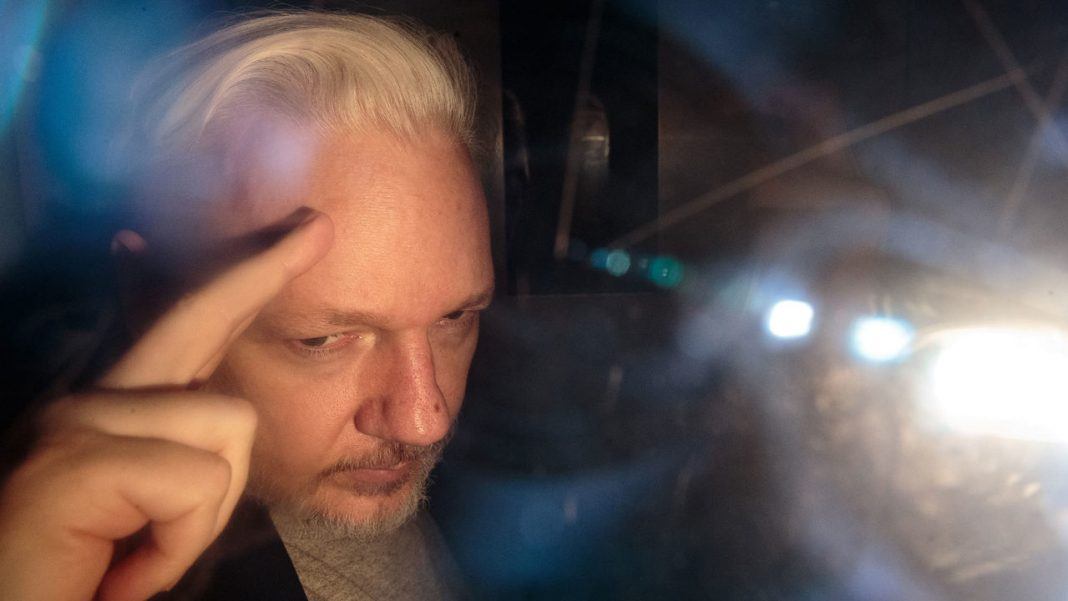
Donald Trump has been looking for ways to put more restrictions on journalists, and his Justice Department will be testing First Amendment boundaries with WikiLeaks founder Julian Assange for his role in publishing classified military and diplomatic documents in 2010. The government has never charged a journalist under the Espionage Act, so the fight will be over whether Assange is a ‘true’ journalist or not.
In a case with significant First Amendment implications, the U.S. filed new charges Thursday against Assange that accuses him of violating the Espionage Act by publishing thousands of secret and classified documents, including the identities of confidential sources for American armed forces and diplomats.
The Justice Department’s 18-count superseding indictment alleges that Assange directed former Army intelligence analyst Chelsea Manning in one of the largest compromises of classified information in U.S. history. It says the WikiLeaks founder damaged national security by publishing documents that harmed the U.S. and its allies and aided its adversaries.
The case comes amid a Justice Department crackdown on national security leaks and raises immediate media freedom questions, including whether Assange’s actions — such as soliciting and publishing classified information — are distinguishable from what traditional journalists do as a matter of course. Those same concerns led the Obama administration Justice Department to balk at bringing charges for similar conduct.
Assange’s lawyer, Barry Pollack, said Thursday that the “unprecedented charges” against his client imperil “all journalists in their endeavor to inform the public about actions that have been taken by the U.S. government.” The Reporters Committee for Freedom of the Press said the case was a “dire threat” to media freedom.
The Justice Department’s decision to pursue Espionage Act charges signals a dramatic escalation under President Trump to crack down on leaks of classified information and aims squarely at First Amendment protections for journalists. Most recently, law enforcement officials charged a former intelligence analyst with giving classified documents to The Intercept, a national security news website.
Legal scholars believe that prosecuting reporters over their work would violate the First Amendment, but the prospect has not yet been tested in court because the government had never charged a journalist under the Espionage Act.
But Justice Department officials sought to make clear that they did not view Assange’s actions as protected by the First Amendment.
“Julian Assange is no journalist,” said Assistant Attorney General John Demers, the Justice Department’s top national security official. “No responsible actor, journalist or otherwise, would purposely publish the names of individuals he or she knew to be confidential sources, exposing them to the gravest of dangers.”
Prosecutors sought throughout the document to make a distinction between what Assange did as the founder and “public face” of WikiLeaks and the work of journalists.
They noted, for example, that he promoted his site to a convention of European hackers and published a list of the classified information he sought as “The Most Wanted Leaks of 2009.” They described how Assange worked with Manning to improperly access Department of Defense computers to gain access to thousands of pages of material and encouraged her as she delved through databases for information.
Prosecutors also say the danger wasn’t just to the U.S. government, but to people who worked with it.
Reports from the wars in Afghanistan and Iraq published by Assange included the names of Afghans and Iraqis who provided information to American and coalition forces, while the diplomatic cables he released exposed journalists, religious leaders, human rights advocates and dissidents in repressive countries. “Assange created a grave and imminent risk that the innocent people he named would suffer serious physical harm and/or arbitrary detention.”
Assange in an August 2010 interview called it “regrettable” that sources disclosed by WikiLeaks could be harmed, but said WikiLeaks was “not obligated to protect other people’s sources,” according to the indictment.
The new Espionage Act charges go far beyond an initial indictment against Assange made public last month that accused him of conspiring with Manning to crack a defense computer password.
First Amendment aside, the indictment poses a secondary ethical question for journalists. News organizations around the world widely used the Manning material, which provided previously unavailable information about the Guantanamo Bay detention center, the wars in Iraq and Afghanistan and international diplomacy.
Assange is now being prosecuted for releasing documents that many reporters found inherently newsworthy.
Mr. Assange was secretly indicted in March 2018 in federal court in Alexandria, Va., on a charge of conspiring to commit unlawful computer intrusion. Prosecutors accused Mr. Assange of agreeing to help Ms. Manning crack an encoded portion of a passcode that would have enabled her to log on to a classified military network.
Assange, 47, is in custody in London after being evicted from the Ecuadorian Embassy in April. The U.S. is seeking his extradition.
The Obama administration considered charging Mr. Assange under the Espionage Act but never did out of concerns that such a case could chill traditional journalism.
Manning, who was convicted in military court for providing a trove of classified documents to WikiLeaks, is currently in a northern Virginia jail on a civil contempt charge.
Manning spent two months in the Alexandria Detention Center beginning in March after she refused to testify to a grand jury investigating WikiLeaks. That grand jury is sitting in Alexandria, where Assange is charged. She could remain in jail for up to 18 months, the length of the current grand jury’s term.
Manning has said she believes prosecutors want to question her about the same conduct for which she was convicted at her court-martial. She served seven years of a 35-year military sentence before receiving a commutation from then-President Barack Obama.

